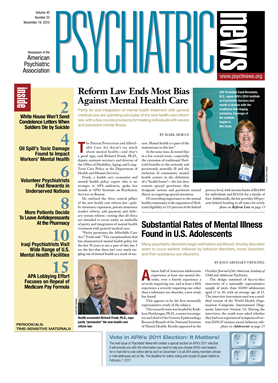Two of the six mental health teams from Iraq concentrated on concerns that suffered from Iraq's long isolation from the rest of the world (see
Iraqis' Visit Turns Into Mutual Learning Experience). They hope to adapt what they learn for use at home, said participating Iraqi psychiatrists.
One group sought to learn more about modernizing Iraq's forensic psychiatry system. Forensic facilities there consist of just one 250-bed unit in a 1,200-bed psychiatric hospital in Baghdad.
Iraq has a mental health code, but it is not consistently adhered to, and the line between civil and compulsory commitment is not clear, said Naamah Humaidi, M.D., of Baghdad's Al Rashaad Hospital and the Iraqi Ministry of Health.
The Iraqis wanted to observe the U.S. practice to better separate the two and to improve communications with the Ministry of Justice, said Humaidi in an interview in Washington, D.C.
At mental health courts in Baltimore and in Montgomery County, Md., they observed how judges, lawyers, and mental health personnel worked together to get mentally ill defendants back on track. At present, Iraqi law does not permit conditional release or probation, but those strategies may someday become options, said Humaidi.
Team members also attended a three-day training program run by the state of Maryland for new forensic evaluators.
“They got a real understanding of the array of services for persons in the criminal-justice system or at risk of being in it,” said Erik Roskes, M.D., director of forensic services at Springfield Hospital Center in Sykesville, Md., where the Iraqi forensic group was based. “They saw how the system worked from the point of police intervention through parole or probation.”
They also observed forensic mental health fellowship programs and discussed human-rights aspects of mental health care, like confidentiality, patient privacy, informed consent, and patient rights.
“We want to be a national resource when we return home,” said Humaidi.
Another team studied U.S. practices in substance abuse treatment at INOVA Fairfax Hospital in Fairfax, Va.
Substances of abuse are different in Iraq from those in the United States, said Nasif Al-Hemiary, M.D., of the Iraqi Ministry of Health and a professor of psychiatry in the College of Medicine at the University of Baghdad.
The problem there is less with heroin, cocaine, or marijuana than with alcohol, tobacco, and certain prescription drugs, he said. Of abused prescription drugs, the most common are not opioids or benzodiazepines, but artane, an anticholinergic used to counter the effects of antipsychotic medications.
At INOVA, Hemiary's group studied ways of doing patient intake assessments and managing the admission process, said Maria Hadjiyane, M.A., L.P.C., the hospital's counseling manager. On the psychiatric unit, they observed the interaction between nurses and patients, a different relationship from the one they are used to in Iraq.
“We are already working to integrate substance abuse services into primary care in Iraq, but that requires more training for mental health professionals beyond lectures,” said Hemiary.
They will be backed up by frequent Internet consultations with their mentors at INOVA Fairfax Hospital and UCLA, said Hadjiyane.

